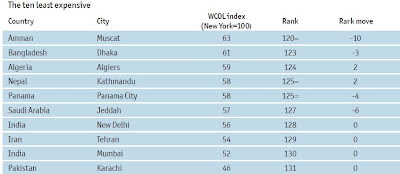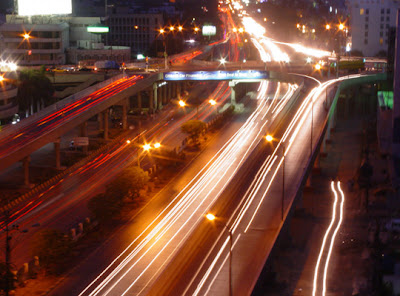PakAlumni Worldwide: The Global Social Network
The Global Social Network
Karachi Offers Expats High Living at Lowest Cost
A worldwide cost of living survey of 131 major cities has found that big South Asian cities of Dhaka, Delhi, Karachi and Mumbai are among the ten least expensive in the world. In other words, foreign visitors, expatriate businessmen and overseas investors can live better for less in South Asia, particularly in Karachi which is the cheapest on the list, just one rank below Mumbai, India.
The survey conducted by Economist Intelligence Unit (EIU) compared more than 400 individual prices across 160 products, including food, clothing, transport, rents and private schools.
India and Pakistan’s cheap labor and land costs are making the area “attractive to those bargain-hungry visitors or investors willing to brave some of the security risks that accompany such low prices,” the survey said, as reported by the Wall Street Journal.
The Swiss city of Zurich remained the world’s most expensive, Tokyo was the runner up, with Singapore now listed as the world’s 9th most expensive city. Singapore was listed as the 6th most expensive last year, but remarkably was ranked 97th in 2001.
Here's how EIU describes the world cost of living survey methodology:
"More than 50,000 individual prices are collected in each survey, conducted each March and September and published in June and December. EIU researchers survey a range of stores: supermarkets, midpriced stores and higher priced specialty outlets. Prices reflect costs for more than 160 items in each city. These are not recommended retail prices or manufacturers’ costs; they are what the paying customer is charged. Prices gathered are then converted into a central currency (US dollars) using a prevailing exchange rate and weighted in order to achieve comparative indices. The cost-of-living index uses an identical set of weights that is internationally based and not geared toward the spending pattern of any specific nationality. Items are individually weighted across a range of categories and a comparative index is product using the relative difference by weighted item."
The cheapest cities on the EIU list are dominated by Asian and Middle Eastern cities. The latter of these is due, in part, to the use of price controls and the pegging of currencies to the US dollar. The former seems to have a more structural basis, with cheap labor and land costs making India and Pakistan incredibly attractive to those bargain hungry visitors or investors.
Currently, there are over 300 foreign multinational companies, including American and European companies, with operations in Pakistan. And more are coming every year in spite of ongoing security concerns and current economic slowdown. Almost all big international brand name American and European companies operate in Pakistan.
Here's an excerpt from a US government website on America's commercial presence in Karachi, Pakistan:
"U.S. firms have a strong presence in Pakistan. More than 70 wholly-owned U.S. subsidiaries are registered with the American Business Council (ABC) and American Business Forum (ABF) in Pakistan. There are also hundreds of local firms representing U.S. firms in the market. Leading U.S. businesses in Pakistan include Citibank, Pepsi-Cola, Coca-Cola, Procter & Gamble, NCR, Teradata, Pfizer, Abbot, Eli Lilly, Wyeth, DuPont, Oracle, Microsoft, Cisco, Intel, Chevron, 3M, IBM, Apple, Monsanto, McDonald’s, KFC, Pizza Hut, Dominoes Pizza, and Caterpillar.
Despite security challenges and common emerging market concerns about intellectual property rights (IPR) protection, contract enforcement, and governance issues, the Pakistan market offers many attractive trade and investment opportunities in a broad range of sectors: among others, energy (power generation); transportation (aerospace and railways); information and communications technology; architecture, construction, and engineering; health; environmental technology; agricultural technology; safety and security; franchising; and services."
Jon Copestake, the editor of the EIU cost survey report, explained that these cheap cities “have been cheap for a long time.” “Even though local inflation is high, it’s coming from a very low base, so it’s only a slight rise in the cost-of-living index,” he said.
Related Links:
Karachi 4th Cheapest for Expats
WEF Study Finds India's Air Most Toxic in the World
Karachi's High Development Index
Karachi Tops Mumbai in Stock Performance
Eleven Days in Karachi
Citymayors website
Karachi Demographic Trends Worry MQM
Pakistan Most Urbanized in South Asia
Do Asia's Urban Slums Offer Hope?
Climate Change Could Flood Karachi Coastline
-
Comment by Riaz Haq on May 10, 2015 at 7:09am
-
#Karachi, #Mumbai, #Delhi among cheapest major world cities to live in. #India #Pakistan
http://pull.db-gmresearch.com/cgi-bin/pull/DocPull/13432-2381/99524... …
Comment
Twitter Feed
Live Traffic Feed
Sponsored Links
South Asia Investor Review
Investor Information Blog
Haq's Musings
Riaz Haq's Current Affairs Blog
Please Bookmark This Page!
Blog Posts
Pakistani Prosthetics Startup Aiding Gaza's Child Amputees
While the Israeli weapons supplied by the "civilized" West are destroying the lives and limbs of thousands of Gaza's innocent children, a Pakistani startup is trying to provide them with free custom-made prostheses, according to media reports. The Karachi-based startup Bioniks was founded in 2016 and has sold prosthetics that use AI and 3D scanning for custom designs. …
ContinuePosted by Riaz Haq on July 8, 2025 at 9:30pm
Indian Military Begins to Accept Its Losses in "Operation Sindoor" Against Pakistan
The Indian military leadership is finally beginning to slowly accept its losses in its unprovoked attack on Pakistan that it called "Operation Sindoor". It began with the May 31 Bloomberg interview of the Indian Chief of Defense Staff General Anil Chauhan in Singapore where he admitted losing Indian fighter aircraft to Pakistan in an aerial battle on May 7, 2025. General Chauhan further revealed that the Indian Air Force was grounded for two days after this loss. …
ContinuePosted by Riaz Haq on July 5, 2025 at 10:30am — 6 Comments
© 2025 Created by Riaz Haq.
Powered by
![]()


You need to be a member of PakAlumni Worldwide: The Global Social Network to add comments!
Join PakAlumni Worldwide: The Global Social Network